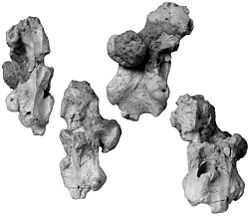Lirainosaurus
| Lirainosaurus Temporal range: Late Cretaceous | |
|---|---|
 | |
| Paratype braincase | |
| Scientific classification | |
| Kingdom: | Animalia |
| Phylum: | Chordata |
| Class: | Sauropsida |
| Superorder: | Dinosauria |
| Order: | Saurischia |
| Suborder: | Sauropodomorpha |
| Infraorder: | Sauropoda |
| (unranked): | Titanosauria |
| Genus: | Lirainosaurus |
| Species: | L. astibae |
| Binomial name | |
| Lirainosaurus astibae Sanz et al., 1999 | |
Lirainosaurus is the name given to a genus of dinosaur from the Late Cretaceous. It was a titanosaurid sauropod which lived in what is now Spain. The type species, Lirainosaurus astibiae, was described by Sanz, Powell, Le Loeuff, Martinez, and Pereda-Suberbiola in 1999.[1] This genus was based on a skull fragment, isolated teeth, several vertebrae including the holotype - an anterior caudal vertebra, and appendicular bones from the Late Cretaceous of Laño (northern Spain). New material from Laño, Spain described by Diaz et al. (2013), which includes cervical, dorsal and caudal vertebrae, dorsal ribs, and a haemal arch, has been assigned to Lirainosaurus.[2] According to Diaz et al., Lirainosaurus can be distinguished based two vertebral characters that are considered autapomorphies: (a) the presence of a lamina in the interzygapophyseal fossa of the most proximal caudal vertebrae; and (b) the spinopostzygapophyseal structure is not posteriorly projected in the posterior caudal vertebrae. With respect to phylogeny, the combination of characters present in the new axial remains described, supports that Lirainosaurus astibiae is a derived Lithostrotian Titanosaur closely related to the Saltasaurinae.
References
- ↑ J. L. Sanz, J. E. Powell, J. Le Loeuff, R. Martinez, and X. Pereda-Suberbiola (1999). "Sauropod remains from the Upper Cretaceous of Laño (north central Spain). Titanosaur phylogenetic relationships." Estudios del Museo de Ciencias Naturales de Alava 14(1):235-255
- ↑ Verónica Díez Díaz, Xabier Pereda Suberbiola & José Luis Sanz (2013) The axial skeleton of the titanosaur Lirainosaurus astibiae (Dinosauria: Sauropoda) from the latest Cretaceous of Spain. Cretaceous Research